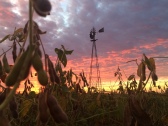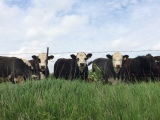According to the Merriam-Webster Dictionary, agriculture is “the science, art, or practice of cultivating the soil, producing crops, and raising livestock and in varying degrees the preparation and marketing of the resulting products.” To a student in the WIU School of Agriculture, defining the term is simple. For a student without an agriculture background and/or little knowledge of the industry, the term is not so easy to define. I had the opportunity to ask three Western Illinois University students outside of the WIU School of Agriculture to define agriculture and a couple of controversial terms the industry faces today. All three students had similar responses to the majority of questions, which leads me to believe the School of Agriculture has some room to improve on advocating for what is so close to our hearts.
What does ‘Agriculture’ mean to you?
From the students, I learned that agriculture is a compilation of corn, farming, and food production in conjunction to the economy. Agriculture is also responsible for feeding the world, and there is an immense amount of technology that enables farme rs to produce high volumes of food that a majority of the public does not see. One of the interviewed students, Chandler Pillsbury, explained to me that agriculture is unappreciated and misunderstood by some people who are raised in urban areas and not exposed to the industry. He has his hometown and local school system to thank for providing him with his understanding of agriculture.
rs to produce high volumes of food that a majority of the public does not see. One of the interviewed students, Chandler Pillsbury, explained to me that agriculture is unappreciated and misunderstood by some people who are raised in urban areas and not exposed to the industry. He has his hometown and local school system to thank for providing him with his understanding of agriculture.
What is a ‘GMO’?
A question that can lead a class of agriculture students in an uproar, had the students silent from uncertainty. The consensus for GMOs was not unanimous among the non-agriculture students, however. Tatiana Garcia came to the conclusion that, “I don’t know what it stands for, but I feel like it’s some chemical that is bad for plants.” The other two could not define the term, but understood that it is beneficial for food production and is a controversial topic in the media today. I asked each student if the concerns for GMO products have promoted them to purchasing GMO free alternatives, and each said that price is the determining factor, not GMO-free labeling.
What does it mean for a product to be ‘Organic’?
The students well determined that chemicals cannot be used on a product labeled ‘organic’. Organic products are also all-natural and pure due to the absence of chemicals. Chandler said that he often thinks of milk when he hears the term organic because that is the only product that he makes a conscientious effort to purchase organic. He has been told that there is a difference in taste between organic and non-organic milk, so he chooses the option that appears more natural and safer to consume. He also purchases organic milk because the c attle are grass feed, a more humane feed regiment for the cattle, rather than fed a grain diet. The last of the interviewed students, Rachel Hamilton, understands there is a difference between organic and conventional food options, but the deciding factor for her grocery store purchases is the cost and not the hype for going organic.
attle are grass feed, a more humane feed regiment for the cattle, rather than fed a grain diet. The last of the interviewed students, Rachel Hamilton, understands there is a difference between organic and conventional food options, but the deciding factor for her grocery store purchases is the cost and not the hype for going organic.
How Should Aggies Respond?
It is apparent that consumers are conscience of food claims that put a negative light on conventional farming. The three students that I interviewed responded to my questions using the media phrases “all-natural”, “safer to eat”, and “chemical-free” without a full understanding of what each phrase meant. They do not know that there are over 20 chemical pesticides that are certified organic, or that the USDA regulates the amount of detectable residues on commercial produce, and that pork and poultry are not allowed to be treated with antibiotics.
It is not the consumers fault to have negative perceptions of conventionally grown food if they are not involved in agriculture and listen to the medias falsified reports. It is our responsibility as agriculture students and future agriculture professionals to shed light to food consumers on the truths about genetically modified food products and organic alternatives. What we cannot do is build a divide between us and food consumers and believe that the media will stop degrading agriculture. Agriculture professionals have to work harder then the media to spread a positive word for agriculture.
Meet the Students
Rachel Hamilton
Rachel is a senior at Western Illinois University majoring in Biology with a concentration in Psychiatry. Her hometown is Minooka, IL, a small suburb of Chicago. After graduation, Rachel plans to continue her education to earn a M.D in Psychiatry. Rachel’s closest connection to agriculture is driving by cornfields near her home.
Chandler Pillsbury
Chandler is a junior RPTA major at Western Illinois University with a minor in Natural Resource M anagement. His hometown is Petersburg, IL, a small rural town 30 minutes north of Springfield. Chandler plans to work for The Department of Natural Resources or Wildlife Conservation after graduating WIU. The closest connection Chandler has to agriculture is through his Uncle who raises livestock and grain crops in Quincy, IL.
anagement. His hometown is Petersburg, IL, a small rural town 30 minutes north of Springfield. Chandler plans to work for The Department of Natural Resources or Wildlife Conservation after graduating WIU. The closest connection Chandler has to agriculture is through his Uncle who raises livestock and grain crops in Quincy, IL.
Tatiana Garcia
Tatiana is a junior Mathematics major at Western Illinois University, minoring in  Business. Her hometown is Mokena, IL, a southwest suburb of Chicago. After earning a Bachelors Degree at Western Illinois University, Tatiana will continue her education to earn a Masters degree in Business or similar discipline in hopes of becoming an actuary or accountant. Tatiana’s closest connection to agriculture is living across the street from a corn field.
Business. Her hometown is Mokena, IL, a southwest suburb of Chicago. After earning a Bachelors Degree at Western Illinois University, Tatiana will continue her education to earn a Masters degree in Business or similar discipline in hopes of becoming an actuary or accountant. Tatiana’s closest connection to agriculture is living across the street from a corn field.
 Hi there! My name is Rachael Sampson and I am a junior at WIU studying AgriScience with a minor in Economics. I live in Petersburg, IL where I was raised on a cattle and grain farm that sparked my passion for agriculture. I am a member of Collegiate Farm Bureau, Horticulture Club, WIU Global Ambassadors, Phi Sigma Sigma and a Centennial Honors College student. After graduation, I plan to attend graduate school to earn a Masters degree in Horticulture.
Hi there! My name is Rachael Sampson and I am a junior at WIU studying AgriScience with a minor in Economics. I live in Petersburg, IL where I was raised on a cattle and grain farm that sparked my passion for agriculture. I am a member of Collegiate Farm Bureau, Horticulture Club, WIU Global Ambassadors, Phi Sigma Sigma and a Centennial Honors College student. After graduation, I plan to attend graduate school to earn a Masters degree in Horticulture.


Rachel this is a wonderful blog. You are absolutely right that it is our fault that the consumer are uneducated. People are only trying to protect themselves their family. We need to work better about getting into mainstream media.
LikeLiked by 1 person
This is a wonderful post that really helps people with an agricultural background understand how people feel and why they feel the way.
LikeLiked by 1 person
Really enjoyed this blog! I thought it was a really great idea to show each students response and how we as agriculture enthusiasts should answer. This is a awesome read and everyone should use this blog to advocate for ag!
LikeLiked by 1 person